
Everything You Need to Know About Storing Your RV for Winter
Everything You Need to Know About Storing Your RV for Winter
Steps for proper storage and considerations of where to store your rolling home.
By: GoLife Staff
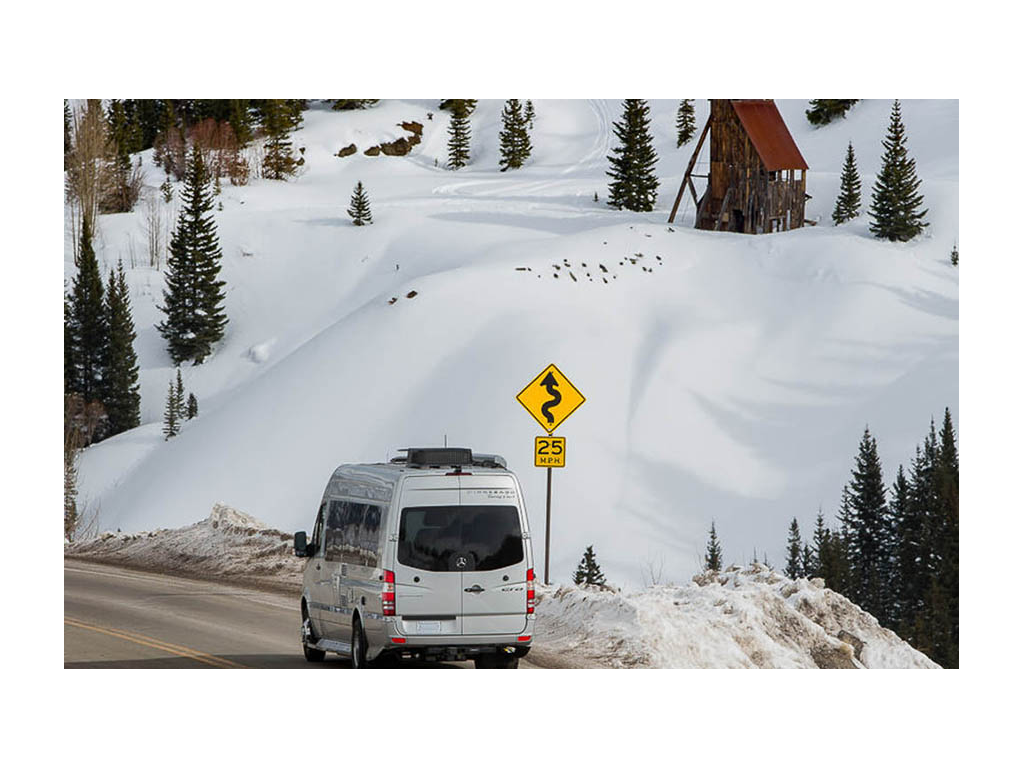
As winter weather really takes hold across the country, many RVers are having to take on the task of preparing their motorhome or travel trailer to go into storage. While it certainly won’t be the most fun you’ll have in your RV, it is a key part of RV ownership – especially in areas with harsh weather.
The good news is: the better job you do when storing your RV, the better experience you will have on that happy day when you get to take it on the much-anticipated first trip of the year!
Why Storing Your RV Properly is Important
Storing your RV is crucial to make sure your investment remains in good working order when not in use. Even if your motorhome or travel trailer won’t be exposed to harsh cold or wind, just letting it sit for months at a time without taking certain steps can cause damage.
Some of the top issues that can occur are:
- Exterior damage from the elements.
- Moisture inside which can lead to mold.
- Plumbing problems, such as a ruptured pipe.
- Dead batteries which may need to be replaced.
- Damage and mess from pests.
- Unwanted smells from mold or forgotten food.
- Weakened or damaged tires.
Steps for Properly Storing Your RV
If you plan to take an extended break from RVing or are in a climate that necessitates storing your RV to protect it from the elements, it is important to properly prepare your motorhome, travel trailer, or van before parking it long-term. There’s a lot more involved than just locking it up!
Winterization of Plumbing
This is the big one since skipping it could seriously damage your RV components! It is recommended to winterize your RV if you are finished using it for the season and the temperature will be below freezing. Winterization differs depending on your RV and you should always refer to your owner’s manual to make sure you follow the correct steps. However, the goal is to fully drain your RV’s water system – including tanks and pipes. (Read more about what supplies you will need to winterize your RV here).

Photo Credit: James & Stef Adinaro.
You’ll also need to follow the instructions in your manual to drain the water heater. Just note that it can be dangerous if the pressure is not released correctly first, so be sure to read the manual carefully.
Disconnecting Power & Turning off Gas
Make sure to turn off all electrical appliances, the water pump, and heater, then turn off the main circuit breaker. You will need to turn off your gas supply valve as well.
Like a car in disuse, you’ll also want to disconnect your fully charged RV batteries and store them in a cool, dry place to minimize the loss of charge. But checking them on occasion and charging as needed is still a good idea to keep them working well.
If not wanting to remove your batteries, choosing to trickle charge them or keep your RV plugged in while stored are other options you can consider. For those with solar power who are storing their RV outside, that should be enough to keep your batteries charged.
Protecting the Tires
Parking your RV for an extended period of time can weaken the tires by having all that weight in the same area. Keeping your RV in a temperature-controlled, level, and dry area away from direct sunlight can help protect your tires. Removing as much weight from within your RV as possible can also make a difference. And making sure weight is distributed evenly is always a good best practice.
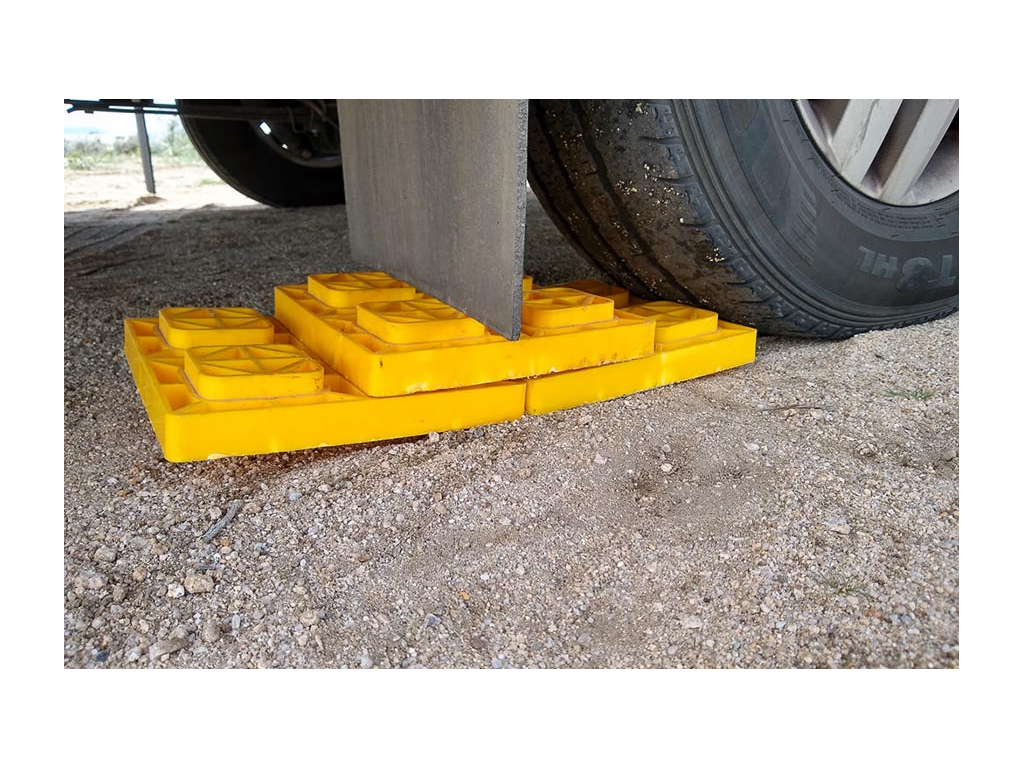
Photo Credit: Jon & Nadia Bajuelo.
Putting your RV on leveling blocks can be a possible solution for keeping pressure off of one area. If possible, moving your RV every couple of months to be on a different part of the tires is ideal.
It is also important to make sure your tires are properly inflated in order to avoid cracking and other issues. If storing your RV outdoors, covering your tires can also help to prevent dry rotting and cracking.
Cleaning & Checks
To avoid critters from trying to get inside your RV, make sure to remove all food items and rubbish. After defrosting your freezer, it is also important to thoroughly clean the refrigerator – plus, the cupboards and all surfaces to make sure no crumbs or food residue is left that may attract rodents or bugs. You should also cover any vents insects could crawl through. Some RVers use steel wool in the exhaust pipe while storing their RV to prevent pests from entering the RV that way.
Giving the outside a good wash and wax is also recommended to help protect the exterior from the sun, if storing outside. A clean RV is also easier to check for issues that should be fixed before storing it away.
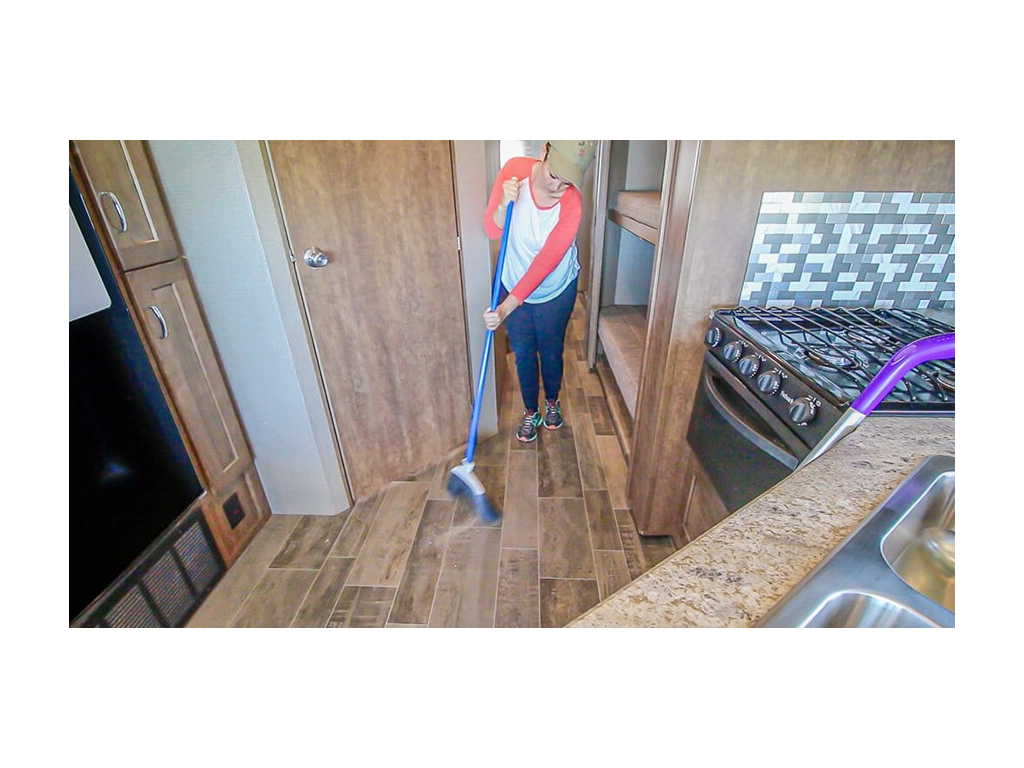
Photo Credit: Nic and Jess Farish
At minimum, you’ll want to check for any holes or cracks and reseal or re-caulk them as needed. Or take your RV to a service center to have those areas fixed to make sure moisture can’t get in the RV (which could cause mold or other damage). While not a must, it can also be helpful to have a professional inspect your RV for any damage to the roof, slides, seals, windows, and panels.
If possible, checking on your RV once a month or so while it is in storage is always a smart idea as well. Of course, don’t forget to lock your RV up before leaving it unattended – including windows!
Where Should You Store Your RV?
While properly prepping your RV is important, it is even more key to choose a good place to store it.
Depending on your RV size, you may have room in your garage, driveway, or on your property to park your RV. Otherwise, you’ll likely need to find a storage facility and pay for a space.
Considerations for Storing your RV at Home
A huge perk in being able to store your RV at your house (or a friend’s house) is the cost savings, however, it may not be worth the hassle depending on where you are hoping to park it.
- Confirm there is room for your motorhome or travel trailer where you plan to put it. Be sure to measure for width as well as height and keep in mind any tree limbs or other obstacles that will need to be removed in order to park your RV there. While a small travel trailer or campervan may fit in a garage, it’s unlikely that a larger motorhome will. Make sure your plan is realistic.
- Check that it is legal to park your RV on your property. This is especially important if you are planning to park it in your driveway or on the road in front of your home. Many residential neighborhoods and cities have rules against how long RVs can be parked outside your home and you will be fined if you break those.
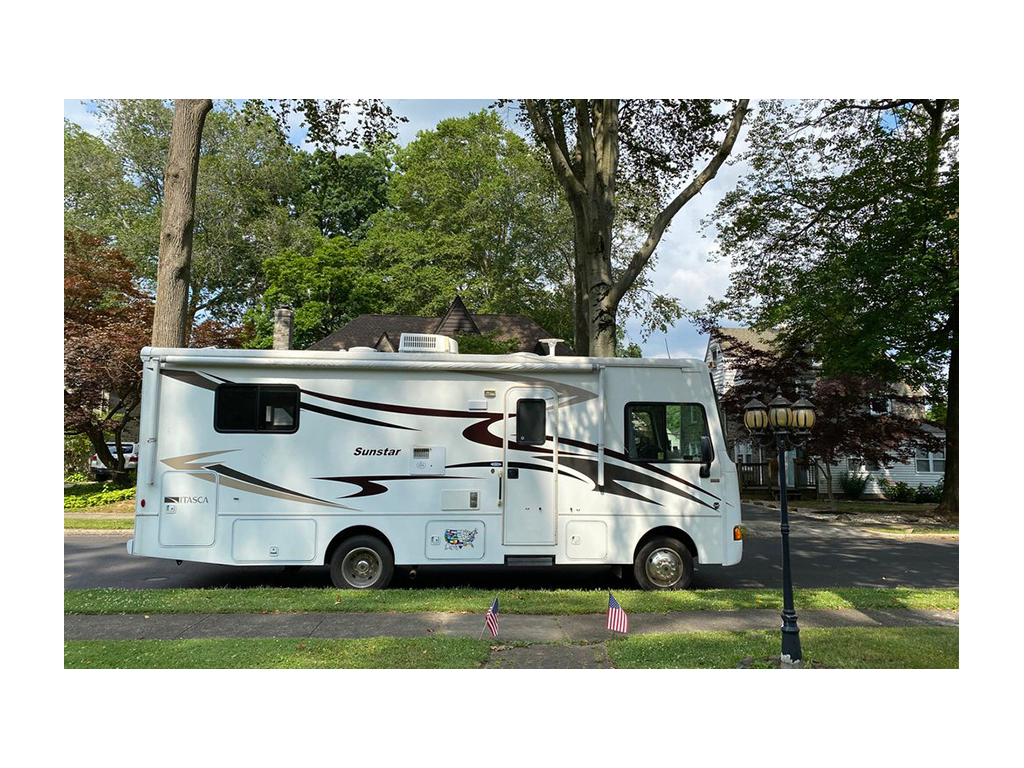
Photo Credit: Shanae & Mark McDevitt (taken when moochdocking at a family member’s home).
- Make sure it will be parked somewhere secure and sheltered from the elements. You don’t want it under any trees and try to put it in an area that will be blocked from strong wind. You may need to invest in an RV cover for it or an outdoor shelter to park it under for added safety.
- Assess any costs associated - such as removing tree branches, buying an outdoor shelter to park it under, or clearing out and renovating your garage.
If it is feasible and cost-effective to park your RV at your house, another great benefit is being able to easily access it to remove snow from the roof and make sure there aren’t any issues, like leaks or pests. This is also an ideal option for anyone who may want to take an off-season trip or have the RV as additional space for guests.
Considerations for Storing your RV at a Facility
Of course, the main concern about storing your RV at a facility is how much it will cost. However, if you don’t have another secure option, paying for storage is well worth it to make sure your RV isn’t damaged over winter.
- Determine if you should store your RV indoors. Depending on where you plan to store your RV, it may be important to protect it from weather extremes by finding an indoor storage option. This will be more expensive, but will often have the additional options of being able to keep it in a temperature-controlled facility or plugged in. If storing outdoors, consider an RV cover to protect the exterior from damaging weather and UV rays.
- Decide which location makes the most sense. It may be ideal to have your RV close to home to check-in on it if planning to store it for multiple months. However, sometimes it is more practical to store it in an area of the country where you plan to spend the most time RVing – often this might be in a warmer area that doesn’t necessitate winterization. (Here’s how one RVing couple chose to store their RV). If you have purchased an RV space in a specific area, leaving it there may be another practical option. Some RV parks may even offer storage options.
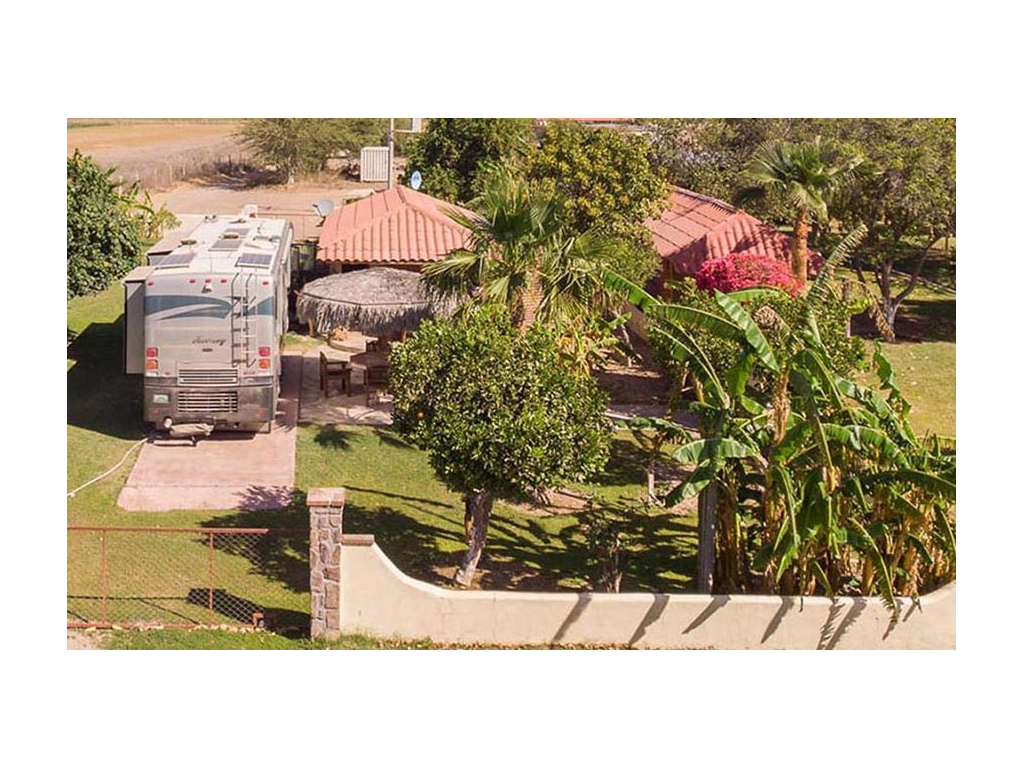
Photo credit: Scott & Jaime Sichler. Their Journey parked at their casita.
- Find out what is covered in the facility’s insurance and consider additional RV insurance coverage if needed, in case anything were to happen while it was being stored. And don’t forget to lock it up before leaving. If wanting an extra precaution, towable owners can add a hitch lock as well.
- Research and compare facilities. Not all RV storage locations are created equally and some will have better reviews, discounts, and options that better suit your needs. Shopping around for the best price certainly won’t hurt and it is always a good idea to due your due diligence when trusting a company with your investment.
Depending on the size of your motorhome or travel trailer, which storage options you choose, and what area of the country you plan to store it in, monthly prices can be upwards of a few hundred dollars. However, damage caused by being exposed to the elements can be much more costly, so that is important to remember.
Looking Ahead to the Fun Part!
It may seem like a long time from now, but spring will be here before you know it and the time will come to reap the rewards of properly storing your RV over winter.
If all goes as planned, you should be able to de-winterize it, turn everything back on, re-stock your necessities, and hit the road. Be sure to check out this article when that time comes for a complete guide to de-winterizing and prepping your RV for your first trip of the season.

Photo credit: John & Nadia Bajuelo.
While preparing your RV for storage may be something you dread every year, try thinking of it as wrapping your rolling home up like a giant present to yourself that will be awaiting you in the new year – in great condition and ready to provide you with awesome new travel memories!
Comments
Comments on this post are moderated, so they will not appear instantly. All relevant questions and helpful notes are welcome! If you have a service inquiry or question related to your RV, please reach out to the customer care team directly using the phone numbers or contact form on this page .